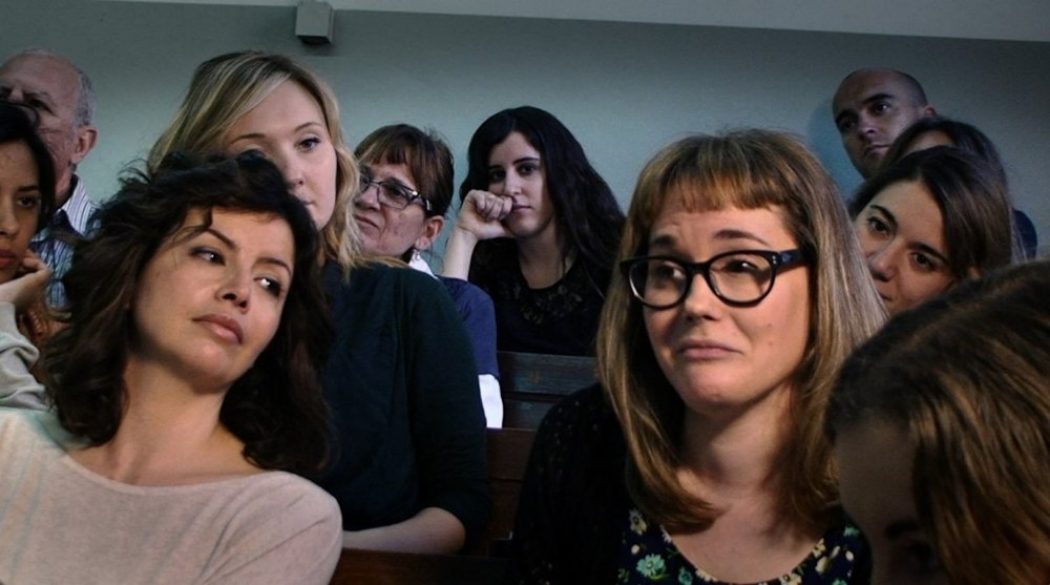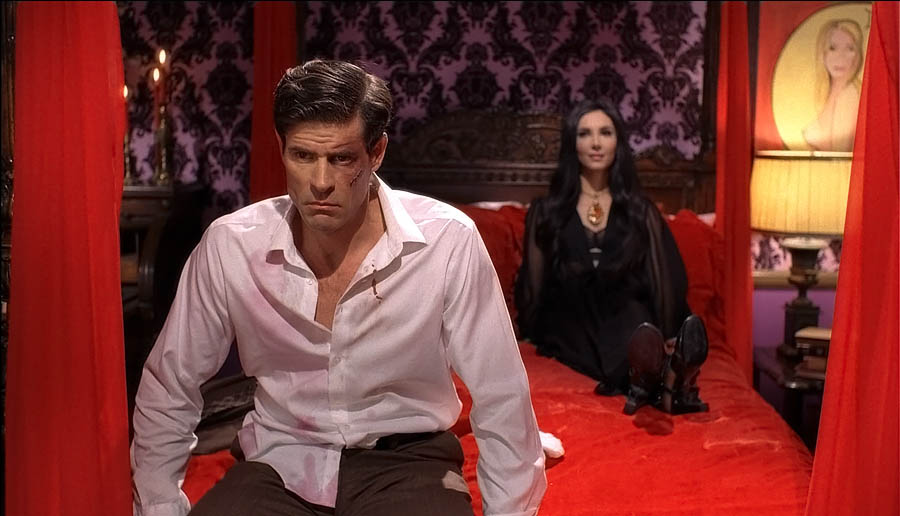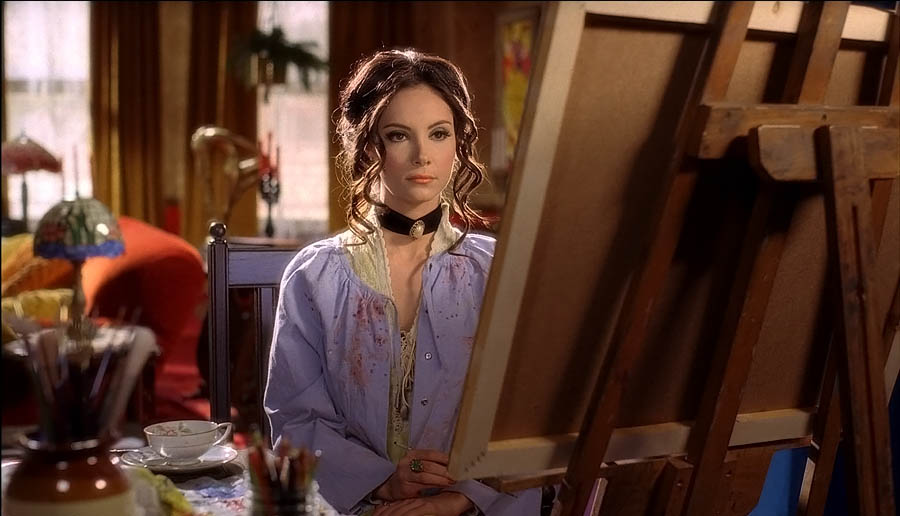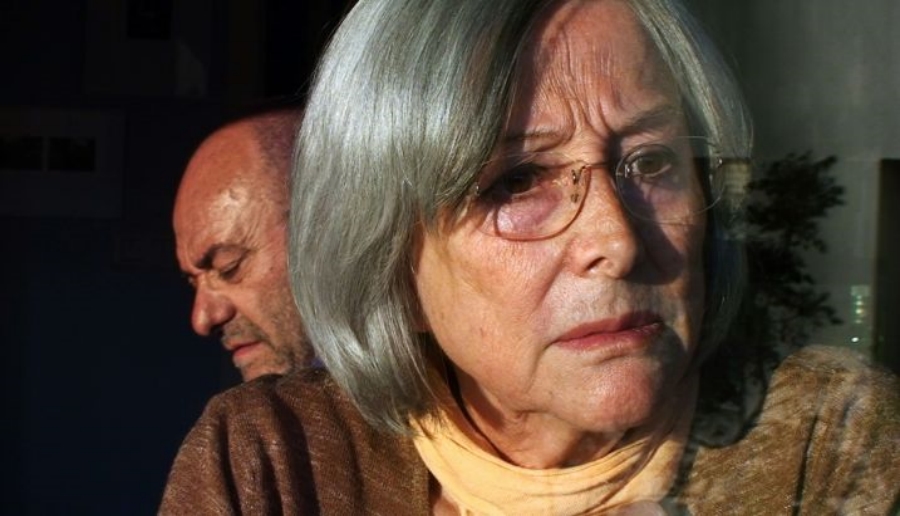The Love Witch and The Academy of Muses: Musings on two very different but thoughtful programming selections on the fest’s final day
The final presentation at this year’s Wisconsin Film Festival was The Love Witch, a gleefully retro homage to everything from Jacques Demy’s Donkey Skin (1970), Hitchcock’s Marnie (1964), to Jess Franco’s whole risqué filmography (projected on 35mm, no less), vividly expressed in Anna Biller’s eye-popping, exquisitely hand-crafted production design. The film’s overtly silly satire of antiquated sexual politics and seventies television crime procedural is likely to diminish its carefully constructed look at gender roles in relationships, particularly amidst its dizzying cultist rituals. As the titular pouty-lipped witch Elaine (Samantha Robinson) seduces the latest man she fancies, Griff (Gian Keys), the chiseled Adonis of a detective, alternating voiceovers articulate their inner desires and prevailing viewpoints that divide women and men. Imaging a future together, Elaine expresses an undying affection where she would become so well-acquainted with a man to be able to predict and linger on his charming habits and idiosyncrasies; Griff asserts the exact opposite in that knowing someone so completely, they lose a kind of mystical, idealistic quality. Essentially, his vision of a woman would no longer be of a muse to be worshiped but rather reduced to the realm of, well, his fellow men. It’s one of the film’s few poignantly profound moments, conveyed with certain comedic intent but with a darker resonance that carries over into the origins and traditions of cinema that precede Biller’s film by an upwards of a hundred years.
Actually, it dates back much further, argues director José Luis Guerín in The Academy of Muses, which screened earlier in the day at Sundance Cinemas on the final afternoon of the festival. Interestingly, the two tonally disparate films share a similar subject in the representation of women in art throughout history. But the unique amalgamation of verité documentary and fictional narrative forms, shot at the University of Barcelona with philology professor Raffaele Pinto and his “protégées” (an equal amalgamation of real students and actors), plays to a much different audience both within the context of the frame and beyond it. In this film-as-academic-prompt approach, Guerín’s leading lecturer, the loquacious Pinto, instigates a discourse about love as the most noble of passions (with reference to Dante’s Divine Comedy and Greek mythology in Apollo, Orpheus, Eurydice, etc.) Pinto’s own wife Rosa (Rosa Delor Muns) then refutes him, claiming love is an invention of the aforementioned literature that has created not only unrealistic expectations but palpable ramifications that can be observed in the context of the film. The conversation at their home feeds into the dense daytime discussions in the classroom broadly grouped under the professor’s idea of women as muses for men in their fiction and in own realities. But while Pinto intends this definition to be reverent of beauty and meaning (“Without muses, poetry becomes solipsistic,” he says), it’s also reductive in the way it denies women intellectual power and authority, the very power he wields and is privilege to throughout the film and his actual career.
As the calendar shuffles from late November through December and January, the title of The Academy of Muses becomes progressively misleading and astutely withholding. Guerín positions himself as a feminist by gradually turning his attention away from Pinto to the majority of female characters/students, who “rise up against their passive role by redefining traditional notions of beauty, desire, and love” (writes Manuel Yáñez-Murillo of Film Comment), the same that exist in the lavish Technicolor-imitative fantasy of Anna Biller’s Love Witch. On the nature of human portraiture and gaze, The Academy of Muses carefully confronts notions that have existed in both commercial cinema and erudite texts alike. In example of the latter, John Berger’s Ways of Seeing, published in 1972, is famously quoted: “Men act and women appear. Men look at women. Women watch themselves being looked at. This determines not only most relations between men and women but also the relation of women to themselves.” Isolating the first three simple sentences that reflect upon female representation in media, a sense of perverse reciprocation emerges, an entrenched viewpoint, and spell that demands to be broken. The film’s gentlest but maybe most effective retaliation may be in student Mireia (Mireia Iniesta)’s story about developing feelings for a male poet online who comforted her during her father’s illness. Of course, Mireia’s fellow classmate insists that she has, inadvertently succumbed to a kind of male gaze, creating an ideal out of someone in the absence of physical interaction.
Is there something gender-specific to the act of seeing, or is it universal to conflate physical beauty with spiritual? It’s more common to hear about “men as more visual creatures,” but is this expression a myth cultivated and reinforced by the most marketable media in society? Why is human fallibility viewed as something nonnegotiable in a relationship; is it all in the insatiable aspiration to be virtuous, to be better than the skin we’re born in? Like any valuable class or film, The Academy of Muses (as both?) is less concerned with absolute transparency and an end-all moral answer to its tableau of heady questions than it is in fostering a boundless dialogue about representations of masculinity and femininity in classical and progressive regards. Guerín’s tenderly focused handheld lens can produce a sense of disorientation by cutting from one shot/scene to the next rather rapidly, including a literally harmonious expedition to Sardinia, but its steady rhythm and evolution of ideas compensate for an early lack of visual storytelling. The film embraces something uniquely epic in a concise ninety-minute experience through its marriage of micro-budget documentary and narrative elements. As in The Love Witch, once again, The Academy of Muses creates a forum for not only women to reciprocate but actively change the way in which art is thought to be most actively controlled by men. This lofty ambition cannot rest upon the shoulders of one director, male or female, but The Academy‘s effusive language strikes a moving and occasionally humorous tone about what it has meant to be inspired, to love in the past tense, and what a more egalitarian future may resemble. And that’s an honestly noble thought to leave the Wisconsin Film Festival with.




